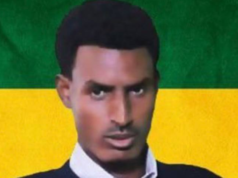theguardian
The radicals are pressing for a French Revolution-style solution – a mass execution of the aristocracy
They are crowded into three long army barracks, sleeping on simple army cots, their heads shaven as if they are condemned men, their food brought to them three times daily by wives already dressed in black for mourning.
These were once the high and mighty of Ethiopia – princes, imperial courtiers, provincial nobility, aristocratic landlords, blue-blooded ministers, and much decorated generals. They ruled entire provinces, owned enormous estates, and commanded private armies and could boast of belonging to royal families tracing their ancestry 2,000 years to the founding of the Ethiopian monarchy.
Today they are the humbled captives of young and unknown military officers, members of a mysterious Armed Forces Committee that has set out to bring revolution to this ancient mountain kingdom of feudal lords and a once all-powerful Emperor.
Officially these prisoners of the revolution number only around 150, but it is said the total number of those arrested is about 350.
The fallen aristocrats are being kept in rundown buildings near the city centre that serve as the Fourth Army Division’s headquarters. Three times a day the road outside the compound is the scene of traffic jams as families come with food and messages (the army will not feed the prisoners).
Their crimes, according to the military, include corruption, abuse of power, maladministration and misappropriation of State funds and lands, a cover-up of the disastrous drought afflicting the country, and, above all, obstruction of badly-needed reforms.
Their fate is uncertain. Theoretically, the prisoners are awaiting the outcome of an investigation by a 15-man committee of inquiry into the alleged misdeeds of the old regime, a process expected to take two years.
But relatives of the prisoners feel they have become hostages of the military committee and that they will be the first to die if any attempt is made by Emperor Haile Selassie to overthrow the reform movement.
It is rumoured that the radicals among the reformers, still in a minority, are pressing for a French Revolution-style solution – a mass execution of the aristocracy. The military committee, however, is dominated for the moment by relatively moderate men who have committed themselves to a revolution “without any bloodshed.”
To Ethiopians all too aware of the violence and civil wars that have periodically marked the history of the kingdom, it is a miracle that the ruling aristocracy has fallen without putting up a fight and practically without a gun having been fired.
Some of the most powerful aristocrats like Ras (prince) Asrate Kassa and Ras Mesfin Sileshi were said to have private armies numbering thousands ready to die for them but these reports have turned out to be part of Western and even Ethiopian mythology about Ethiopia.
Asrate was arrested at his home on a hillside overlooking Addis Ababa without putting up a fight, and Mesfin gave himself up when the military threatened to expropriate all his lands and personal property.
“These people were absentee landlords and rulers out of touch with their own people,” one Western diplomat said. “Nobody was ready to fight for them.”
Indeed, few tears are being shed for Ethiopia’s fallen aristocrats and there is a widespread feeling among Ethiopians that justice has at long last prevailed. This feeling is being strengthened by the horrifying testimony of the old regime’s political prisoners who are now being freed, some of them after nearly 25 years in gaol.
One journalist, Negede Gebrab, who had been in prison 17 years for advocating a Socialist people’s republic, said he had spent 36 months in solitary confinement living on dried peas and 50 grams of water a day. He said he was repeatedly whipped, bound up much of the time in 30lb of chains, and periodically dragged naked across the rough gravel of the prison compound.
Another prisoner, a farmer named Bariso Odda, said an army general had taken his 48-acre farm, raped his wife, and thrown him into prison for being involved in an uprising against local landlords last spring. In prison, Bariso said, he was hanged upside down, had a red hot sickle shoved into his mouth, and was further tortured when he could not answer questions put to him by the police because he was so badly burned.
If the aristocracy is doomed as a ruling class in Ethiopia, many individual members of noble families are none the less still faring well under the new regime. The most striking example is the Prime Minister, Michael Imru, who is the son of a ras, although one famous for his radical views and acts (Prince Imru gave away all his land years ago).


























